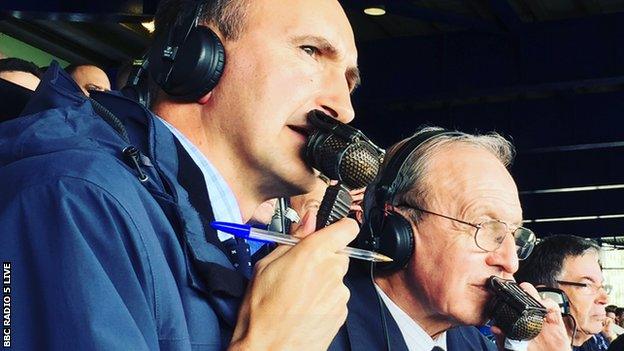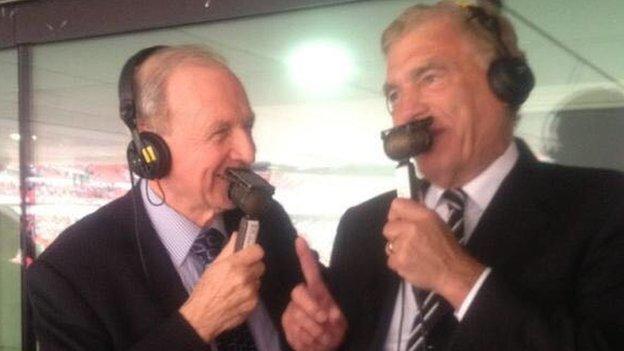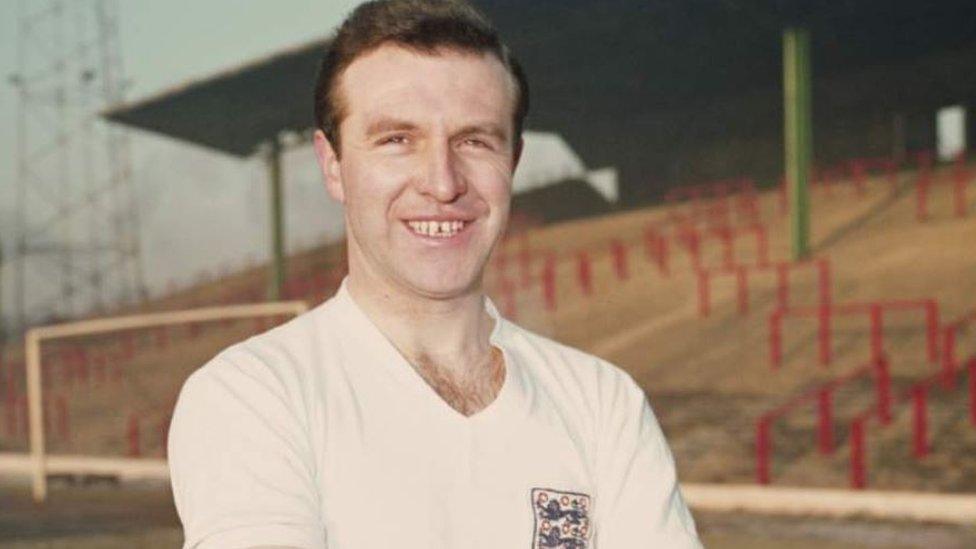Jimmy Armfield: BBC Radio 5 live's John Murray on his friend and colleague
- Published

Former England captain Jimmy Armfield has been described as "a national hero", after his death aged 82. He was part of England's 1966 World Cup-winning squad, but did not play in the final.
Former England captain Jimmy Armfield has died at the age of 82. As well as successful spells as a player and manager, Armfield worked as a football summariser for BBC Radio for almost 40 years. Here, his friend and former colleague John Murray pays his own tribute...
It will be true for so many who read this that they felt they really knew Jimmy Armfield.
Indeed anyone of middle age or younger who has followed football on BBC Radio will have listened to him for all of their lives.
I had the pleasure and privilege of both doing that and being able to work alongside him. And what a reassuring presence he was.
He had a lovely, soft Lancastrian accent and some memorable 'Armfieldisms', such as "I was right behind that...", "...that's what I call...", and - a personal favourite - "I thought that'd 'appen". The reason he did think it would happen, of course, was because he had pretty much seen and done it all in the game.
As a commentator, I knew if I had Jimmy alongside me, we would be able to handle whatever situation any match threw up.
He would arrive with his little notebook in which he had hand-written his expected teams, and he would never be far out. Invariably he would be wearing a flat cap, and his advice to anyone feeling the mid-winter cold in a football stadium would be to "wear a hat". Typical Jimmy - simple but sound advice.
Travelling abroad with Jimmy could be a challenge.
He certainly knew what he liked, and it didn't involve anything cheesy or spicy. "No queso," he would say, using the Spanish word for cheese. "Tell them I don't like queso." And, on being given a menu in a foreign language, he handed it straight back to a puzzled-looking waiter and said: "Do you do soup? I like soup."
Jimmy would also be a creature of habit. When we were in Porto for Euro 2004, we stayed away from the city centre opposite a run-of-the-mill, no-frills cafe that he adopted. By the time he left, he had befriended the staff, who were used to this request: "I'll have what I had yesterday."
He could be a bit of a minor hypochondriac at times, too.
Early one morning in Brussels, where we were for Euro 2000, there was a sharp knock at my door. Jimmy was standing there squinting up at the ceiling with a bottle of fluid in his hand. Without so much as a good morning, he walked straight past me into my bathroom saying: "Son, can you put these in for me? I can't do it on my own." With eye drops duly administered, off the former England captain went, back to his room.
But he was not to be trifled with either, as you would expect of someone who had been a leader of men. At France '98, Simon Brotherton and I travelled to Montpellier with Jimmy to cover a match. It was a stiflingly hot day, and afterwards we had to get back to the airport to fly to our next destination.
There was a lengthy queue to get a taxi, and a couple of young men pushed in front of us. "Oi, you!" said Jimmy, tapping them on the shoulder, and motioning with his thumb to the back of the queue. One look at his face, they saw he meant business and sloped off in the direction the Armfield thumb was pointing.
I think I can say with some confidence that he would have loved to have seen England win the World Cup again.
He was extremely passionate about the fortunes of the national team, and would always be so enthusiastic at seeing promising young England players.
I remember him being so excited when Wayne Rooney burst on to the scene, and our football producer Charlotte Nicol tells me she remembers Jimmy leaping up and punching the air when Michael Owen scored that thrilling goal against Argentina at France '98.
In common with many who worked alongside him, Charlotte says she regarded him as something of a second father.
Jimmy also had a desire to cover at least one more match for BBC Radio.
I just expected to see him back with us again, as I did when he had cancer first time round.
Even within the past fortnight, when I heard he was struggling, I thought if anyone could bounce back, Jimmy could.
Very sadly, it was not to be.
But we were all very lucky to know him as long, and in whatever way, as we did.

Sir Trevor Brooking said of Armfield: "Jim was the ultimate gentleman, he had a really lovely manner about him and I think that's why people enjoyed listening to him."
- Attribution
- Published22 January 2018
